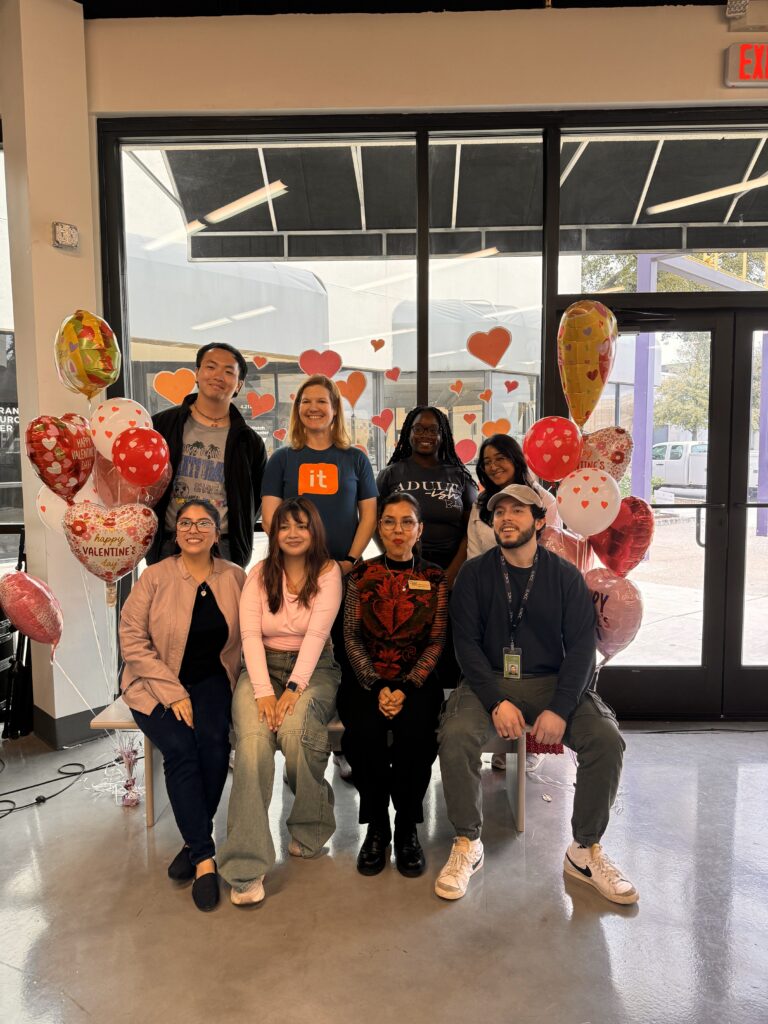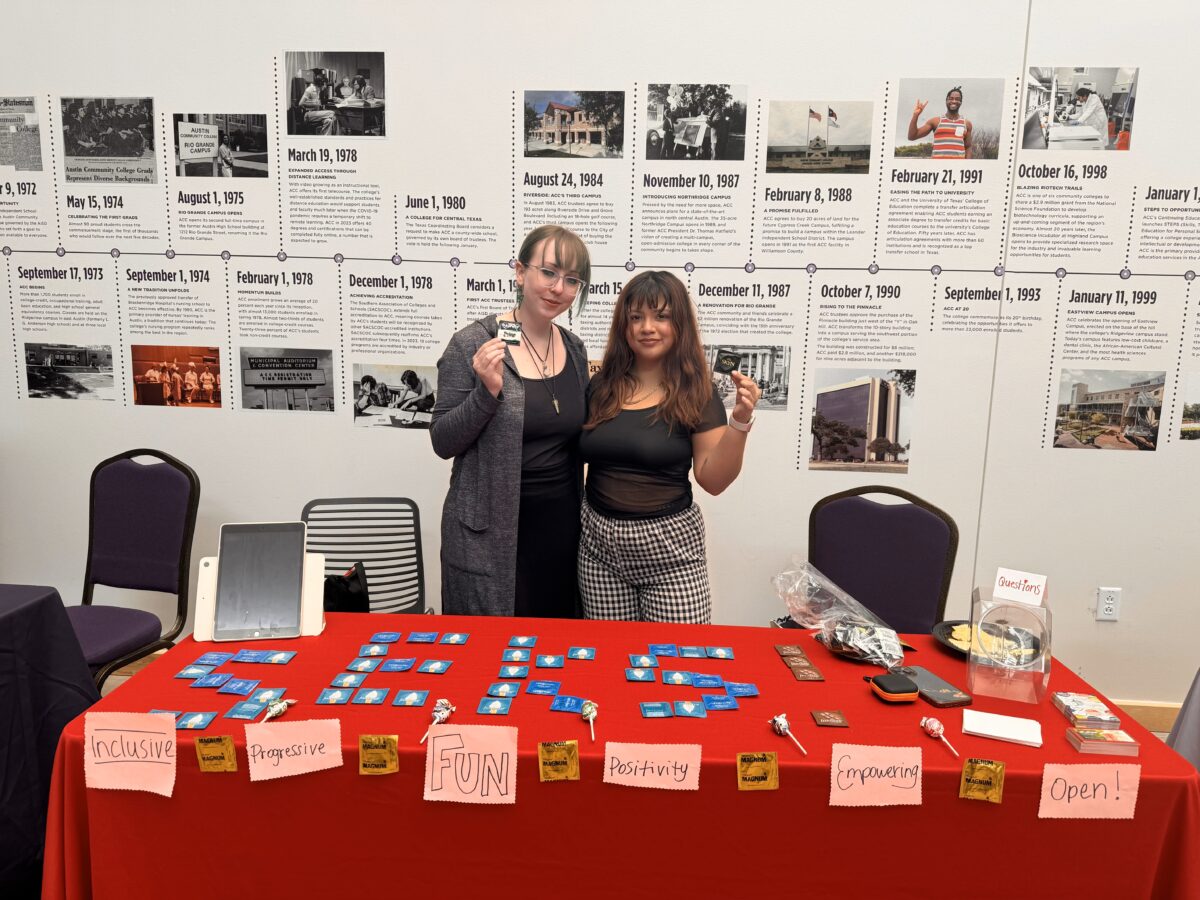Written by Alice Wilson
Throughout the semester, the Student Government Association (SGA), along with the recently formed Safe and Empowering Knowledge for Sexuality (SEKS) club, have been campaigning to secure funding for free menstrual products to be available in every ACC bathroom.
“[In the Fall 2024 semester]… we will be launching our research trial, which will be helping with our data to get ACC to fund free menstrual products across all campuses and all bathrooms,” said Nivedita Anandaramankala, the chair for the project and historian for the SGA, in an episode of ACCENT’s podcast. “We will be conducting surveys during the project and after the run… tell everyone about it.”
The two groups’ main priority is to gather sufficient data about both the need and expected effectiveness of a program like this, in order to make a convincing presentation to the higher-ups at ACC. With 11 ACC campuses located throughout Central Texas, their first challenge has been navigating the differing financial policies of each.
“Every campus is different,” said Marisela Perez, the former president of the SGA and co-chair of the project. “We actually visited all of them in December to understand if they’re accessible or not. We realized that [period products] are in Student Life [rooms] on some campuses… [San Gabriel] campus already has them in the bathroom and that’s something that Student Life manages from their budget.” Some campuses, such as the one in Elgin, have period products in certain bathrooms funded by teachers or staff. “That was our first challenge, to understand the situation in so many different campuses. The budget, because, again, we are just a student organization. Our job is just to do the research and present it to the administration, so hopefully they address the situation.”

With available access to proper hygiene products, the research shows that having a period need not impact the daily lives and education of female students. Without access, however, reports show that periods become a disempowering experience, impact women’s education and even become sources of anxiety and shame.
According to a study published by the research site Statista, 25% of female students in the United States are unable to do schoolwork because of a lack of access to period products – an aspect of a larger issue referred to as “period poverty.” Period poverty encompasses both a lack of access to menstrual products – largely but not solely due to economic factors – as well as insufficient education about menstruation and menstrual hygiene. A 2021 study from the BMC Women’s Health Journal reflects that this is more commonplace than one might expect, reporting that 10% of college-aged women experience the effects of period poverty every month. These numbers are higher among low-income families as well, particularly amongst immigrants to the US and first-generation college students.
One plausible reason that menstrual products haven’t already been made available in all restrooms at ACC, might be that they are currently available at student life for free already. Despite this, representatives from both the SGA and SEKS club make the case that this isn’t enough; that ACC needs hygiene products available in the bathrooms themselves. Their reasoning comes from Student Life’s restricted hours, which don’t always or even often align with the needs of part-time students who rely on night classes. What’s more, the location of the Student Care Center is not easily accessible to all buildings or classrooms in ACC’s large Highland campus; additionally, visitors without a student ID card are prevented from accessing menstrual products at all.

Adding to this, the SEKS club believes that many students may feel uncomfortable sharing their personal health information with unfamiliar people manning the desk at Student Life (no matter how friendly and approachable ACC’s staff might be).
A 2023 study also published by Statista, reports that 63% of teenage students in the US are “especially self-conscious of periods in the school environment,” and 88% of students “hide period products when walking out of class to go to the bathroom.” The SEKS club argues that these numbers give firm ground to the importance of offering free menstrual products in all public female restrooms – beyond just ACC, which already seeks to provide access to groceries, transportation, and child-care programs at no cost.
Why are periods so taboo? “It’s because we don’t talk about it,” answers Alejandra Cardenas, founder of the SEKS club. “That’s what needs to change.” Cardenas’ main goal in starting the ACC Student Organization was to tackle such stigma that continues to exist not only around menstrual health and education, but sexuality in general. “My hope for the club is that we can hear people out. If we want to talk about Safe Sex… if we want to talk about pleasure, because that’s also important, if we want to talk about anatomy, that’s fine. I just want it to be as inclusive as possible too.” Aside from physical access to period products themselves, tackling the stigma around menstruation is one of the main goals of the SEKS club and SGA’s partnership. “[Periods are] something that you are supposed to be celebrating, it’s womanhood,” affirms Anandaramankala. “Even now, my friends [are] educating their brothers on it. Which I find is the most amazing thing ever.”
When one in four girl’s experience in education is limited by a seemingly preventable access-barrier, it’s hard not to question what the hold up is. Undoubtedly, a consciousness of the school’s budget, paired with doubt around the importance of having menstrual products in the bathrooms, have impeded both the SGA and SEKS club’s goals. Anandaramankala is confident, however, that new awareness around the lack of available menstrual care will make all the difference about showing the importance of their efforts.
“It’s not just that people don’t know about it, it’s that it’s never been brought up before. The only reason why we have the student care center, the only reason why we have student life, is because someone brought it up,” said Anandaramankala, “and this right now is students bringing it up. We’re hoping this will cause a bit more noise than an employee [would].”
What happens from here? The organizations emphasize that the realization of the project in full will depend primarily on student participation. Research trials will begin at both Highland and Rio Grande campuses in Fall of 2024, where a survey will be available via a scannable QR code in the bathrooms. The two organizations are calling on the collective student body at ACC to take part.
“Do the survey,” urges Anandaramankala. “Your voice is so important, and I don’t think people realize that.”


